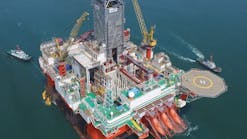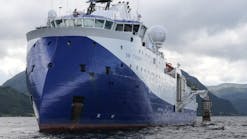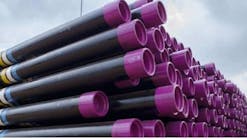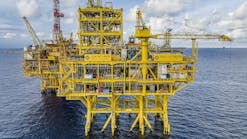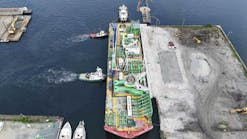Aker Maritime gathers deepwater expertise under single corporate group in Houston
Svein Eggen heads up Aker Maritime's new Deep-water Company.
When Aker Maritime decided to refocus its activities in late 1999, it made a deepwater company one of its main activities. The Deep-water Company, as it is provisionally named, brings together under a single corporate roof a wide range of deepwater expertise that has been developed within the group in recent years.
The new company is headed by Svein Eggen, previously chief operating officer of Aker Maritime, Inc. and has its headquarters in Houston. This was a natural choice, as the city has been the center for Aker Maritime's deepwater expertise for some time. "We made our decision about four years ago, when we realized that the deepwater arena would be more Gulf of Mexico than North Sea, and decided to do it out of Houston," says Eggen.
"So we reshaped our organization, concentrating on key marine, riser, and subsea capabilities, which are the critical technologies for deepwater. That gave us a kind of flying start on what is happening now in the deepwater market worldwide. In one way or another, we've been involved in every deepwater development that has taken place in the Gulf of Mexico."
The Deep-water Company is based on the former Aker Maritime, Inc. business area, including Houston-based Aker Engineering, Aker Gulf Marine, Aker Marine Contractors, Aker Rauma Offshore in Finland and its fabrication yard Aker Mantyluoto. In addition, there are two UK-based companies, Genesis Oil & Gas Consultants which specialize in front-end design and engineering, and the Aker McNulty fabrication yard, the UK's leading location for integrated floater topsides.
Three main strengths
This line-up provides the three main strengths which are essential to success in deepwater activities, Eggen says:
- Front-end work based on the engineering set-ups in Houston and London
- Integration of floater hulls, moorings and risers. Hulls are not a problem, Eggen says, but the weight and complexity of moorings and risers is a serious design factor, and it is crucial to tackle hull, moorings and risers in an integrated fashion.
- Subsea engineering, based on Aker Engineering, one of the two biggest subsea houses in Houston.
"We aim to be best in class in each of these activities," says Eggen says. In addition to its technological expertise, the Deep-water Company also brings contracting expertise, thus putting it in a strong position to both plan and implement large, integrated projects.
Spar competition
Chevron's Genesis platform is one of three spar production platforms delivered by Aker Maritime.
The creation of the Deep-water Company coincides with the ending of the joint venture between Aker Maritime and J Ray McDermott that supplied the only three spar production platforms to have been built to date. "The cooperation between us has been excellent," says Eggen. "But now our clients want the possibility of competition." All spar-related rights and patents have now been vested in a jointly owned company, but the Deep-water Company and J Ray McDermott will now compete for customer's projects.
"Starting this year we expect the spar market to grow to a serious size," says Eggen. "And our goal is to win a serious slice of it." The company is already performing preliminary work on a number of spar projects, not only for the Gulf of Mexico, but also for West Africa and Brazil. The feedback from the three spar deliveries - Kerr-McGee's Neptune, Chevron's Genesis, and Exxon's Diana (undergoing final hookup in March) - has only been positive, Eggen says.
Technology development will continue to enjoy a high priority in the new company. One important center for this will be the newly established Deepwater Solutions Research & Development department, which will continue the development of existing concepts such as the classic and truss spars, as well as advancing new concepts such as dry tree FPSOs, stepped tendons for tension-leg platforms, and composite risers.
The dry tree FPSO is intended for West Africa and Brazil, where sea conditions allow the use of rigid risers together with a moored floater. Called the OilBox, this rectangular concept does not resemble the traditional shipshape FPSO, but is configured to maximize topsides payload, accommodate oil storage and offloading, and incorporate drilling capability with dry surface trees. It has been designed to permit drilling through the hull while the topsides are being built - when completed, these can then be floated on top.
Another item of new technology which offers benefits for deepwater operations is the Suction Embedded Plate Anchor (SEPLA) system. These can utilize polyester mooring lines, thus significantly reducing the weight to be handled and enabling moorings to be installed and retrieved by smaller vessels than the chain and wire used with standard suction piles.
